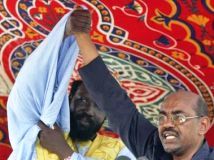Sudan’s new VP to be sworn in
KHARTOUM, Aug 11 (AFP) — Salva Kiir is to be sworn in as Sudan’s first vice president Thursday facing the enormous tasks of implementing a landmark peace deal and carrying on the legacy of his charismatic predecessor John Garang.

|
|
Sudan’s President Omar Hassab al-Bashir (R) and Salva Kiir, successor to the late vice president John Garang, shake hands after a funeral service for Garang in Juba, southern Sudan August 6, 2005. (Reuters). |
Kiir has vowed to uphold peace in line with a deal signed in January that aimed to end a two-decade long conflict between north and south, Africa’s longest running war in which two million people died.
The process was interrupted by the death of Garang in a helicopter crash on July 30.
“Despite the fact that we have lost our hero, the man who brought peace, Dr Garang, we will continue with the same vision, with the same objective, and we will implement the Comprehensive Peace Agreement,” he said when he arrived in Khartoum Wednesday.
One of the primary challenges for Kiir, the ex-southern rebel military chief, will be to form a national unity government with former arch-foe President Omar al-Beshir.
Kiir, who has replaced Garang as head of the Sudan People Liberation’s Movement/Army (SPLM/A), will have to help solve disputes surrounding oil-rich areas on the north-south border.
He is also to continue talks led by Garang with several Khartoum-backed southern militia chiefs with a view to rallying them to the peace agreement.
Kiir has pledged to continue in Garang’s footsteps and carry on his dream for a democratic and prosperous Sudan, which does not discriminate against citizens on the basis of race, creed, gender or ethnicity.
The United States, which invested much political capital into securing the January pact, has expressed confidence in the SPLM and Kiir’s ability to uphold the deal.
But fears about the future of the peace deal were sparked in the immediate aftermath of Garang’s death when 130 people were killed in apparent inter-communal rioting between northerners and southerners.
A key point of argument is oil, and UN special envoy in Sudan Jan Pronk has urged Kiir to push for a quick resolution of territorial quarrelling over oil-rich areas in central Sudan.
Until a 2011 referendum on secession is held in line with the peace deal, oil wealth is to be shared and concessions awarded by a joint oil commission. Most oil fields lie in the south.
Southern residents will be asked at the end of a six-year period whether they want to secede from the north.
Even though some elements of the deal have already been delayed, such as the formation of a reconciliation cabinet and an autonomous government in south Sudan that were due to be installed by August 9, important aspects of the peace deal were already implemented during Garang’s life.
These include the enforcement of a permanent ceasefire and the drafting and ratification of a six-year interim constitution for the country.
During the first four years of the interim period and until general elections are held, Beshir’s National Congress Party will have 52 percent of executive posts and legislative seats and the SPLM 28 percent.
Fourteen out of the remaining 20 percent will go to northern opposition parties, with the remaining six percent to be split among other southern groups.
Officials said they expected Kiir’s swearing-in ceremony to be modest compared to that of Garang, which was attended by a host of international dignitaries and regional leaders.
Authorities have stepped up security in the capital and its suburbs, deploying additional armed police and soldiers on the streets to guard against the kind of deadly rioting that rocked the streets after Garang’s death.
